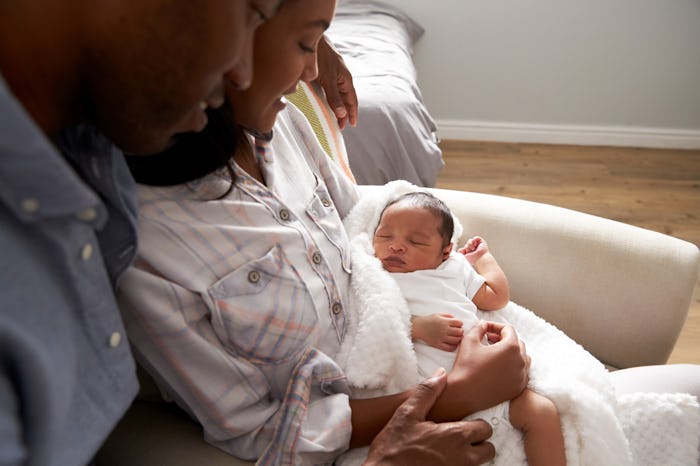Life

How Dads Can Help With Postpartum Depression, According To An Expert
I knew, almost immediately, that what I was experiencing postpartum was something my partner couldn't understand. Our son was born without major complication and he was healthy and smiling and sleeping regularly and eating around the clock and, for all intents and purposes, a "normal" baby. But I didn't feel "normal." I felt heavy. I felt dark. I felt stuck in a perpetual fog. I felt depressed. And because my partner didn't know how dads can help with postpartum depression, that fog made me feel like I was on an isle entire unto myself.
Of course, I wasn't.
A reported one in seven women will experience postpartum depression, according to the American Psychological Association. So it's important for all non-pregnant partners, regardless of their gender identity, to realize the signs and symptoms so they can best support their postpartum partners when and if the time comes.
Sadly, rarely, if ever, is "figure out what postpartum depression looks like" a check on your "baby to-do list," right? It should be, though, and for the cis-men in our lives, who are watching their partners grow their future children inside their bodies, knowing what to look out for, and what to do in the not un-common event their partner will experience postpartum depression occurs, is just as important as learning how to warm up a bottle or change a diaper.
"Anxiety or depression during pregnancy are often risk factors for postpartum depression," psychologist Dr. Venus Mahmoodi of the Seleni Institute tells Romper. "Perfectionism is also a risk factor." Dr. Mahmoodi tells me that depression is typically detected in the first three to six months post-birth, so if a dad realizes his partner is acting differently during that time period he needs to act.
"If [the mom] is speaking about not being good enough or the baby doesn't like her or she can't do anything right," Dr. Mahmoodi says, "it's a sign your partner is experiencing postpartum depression." Additional red flags include thoughts of leaving because the baby would be better off, sleeping too much or not sleeping enough, eating too much or not eating enough, or a general disinterest in the baby.
If you're aware of the signs and realize your parter is likely suffering from postpartum depression, Dr. Mahmoodi says there are things you can do to help. "Dads can help by being mindful of their partner's behavioral and emotional changes," she says. "If your partner is not behaving like her typical self, check in with her and ask her how she's feeling."
While it's vital that dads learn how to swaddle their babies and change diapers and give a baby a bath, it's just as important that they learn how to care for the mothers of their babies.
Dr. Mahmoodi also says it's important to look out for "checking behaviors," also known as checking on the baby constantly, the inability to sleep, feeling sad, showing no emotions, talking about running away, and feeling like they're not doing enough.
The most important thing dads can do for their postpartum partners? "Encourage moms to seek care," Dr. Mahmoodi says. "Dads can accompany moms to the mental health professional, and read books about the topic and educate themselves." According to Dr. Mahmoodi, mothers often don't feel good enough to seek help on their own, and postpartum depression is often seen as a defeat; one they're reluctant to identity let alone discuss out loud. "If a dad has read about the symptoms and causes of postpartum depression, he can support his partner to get the help she needs," she tells me.
It's also important, of course, to acknowledge that dads can experience postpartum depression, too. "Postpartum is a huge transitional time and [dads] are also prone to high expectations of themselves and perfectionism," Dr. Mahmoodi says. "Dads can also feel anxious and experience intrusive thoughts, which can be pretty distressing. In supporting their partners, dads might take on middle of the night feedings, but they should also make sure to sleep during other times."
If you are a working dad, make sure you communicate with your partner and figure out how to best manage a sleep schedule that benefits everyone, Dr. Mahmoodi says. And if you, the dad, notices you aren't feeling like yourself, make sure you seek support, too.
The days, weeks, months, and hell, even years, that follow the birth of a child are rarely, if ever, easy. A fact I learned, of course, the hard way. But I can say that they are exponentially easier when you have someone in your corner, advocating for you and supporting you and helping you along the way. While it's vital that dads learn how to swaddle their babies and change diapers and give a baby a bath, it's just as important that they learn how to care for the mothers of their babies.
Moms need, and deserve, help, too.
If you or someone you know is experiencing depression or anxiety during pregnancy, or in the postpartum period, contact the Postpartum Health Alliance warmline at (888) 724-7240, or Postpartum Support International at (800) 944-4773. If you are thinking of harming yourself or your baby, get help right away by calling the National Suicide Prevention Lifeline at 1-800-273-8255, or dialing 911. For more resources, you can visit Postpartum Support International.
Experts:
Dr. Venus Mahmoodi, Psychologist, Seleni Institute